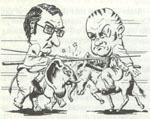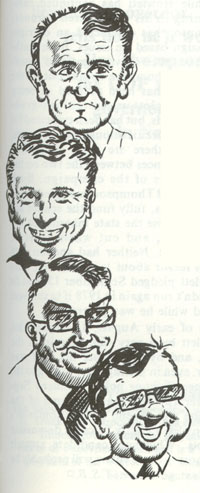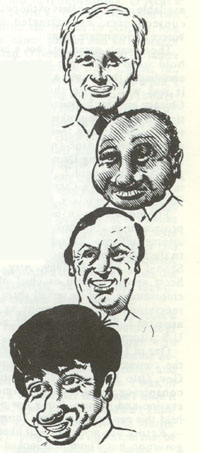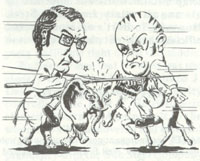

| Regular Democrat Mike Howlett and Republican political novice Jim Thompson offer voters a sharp contrast in style and background. Dogged by the Sun Steel issue, first raised in the bitterly contested primary by his opponent Gov. Dan Walker, Howlett has run on his 15-year record in public administration. Thompson, a tough federal prosecutor, worked hard to get better known downstate and has been forthright on issues. The downstate vote may decide this one |
THE RACES for governor in Illinois over the years have always managed to stimulate a large amount of controversy and excitement. This year's contest between Democrat Michael J. Howlett and GOP newcomer James R. Thompson is no exception.
In a year when the national Democratic party has managed to come together in a rather unusual display of unity behind Jimmy Carter, the primary campaigns of Gov. Dan Walker and Secretary of State Howlett split the party in Illinois right down the middle.
Walker claimed that Howlett was too closely tied with Mayor Richard J. Daley of Chicago and foresaw Daley controlling the state if Howlett were elected governor. Adding salt to the wound. Walker uncovered and revealed that Howlett had occupied a vice presidency with the Sun Steel Company of Chicago, receiving $15,000 a year while serving as auditor of public accounts and secretary of stale. Walker charged that Howlett had been involved in a conflict of interest when occupying both positions at the same time, but in September a circuit judge held that no conflict, of interest had occurred.
Howlett shrugged off the charges arid won a narrow victory over the incumbent governor in the primary, carrying 63 per cent of the vote in Cook County, but losing every county outside of the Chicago area.
In almost completely opposite circumstances, Jim Thompson eased to the Republican nomination., claiming 86 per cent of the vote over an inexperienced, and possibly less motivated opponent, Richard Cooper of Winnetka. Thompson stood .in much better position after the primary than did Howlett — the Republicans indulged in very little name-calling and Thompson could count on the strong support of Republicans statewide.
Thompson, the former United States attorney in Chicago, bridged the gap in the polls by primary time, but many political observers believed that Howlett would resume a commanding position when memories of the Sun Steel controversy had faded from the public's mind. But before long, the conflict of interest charges had come back to haunt him.
Legal opinion sought
On March 5, 1976, Scott named
former Supreme Court Just see Marvin
Burt as special assistant attorney general 10 investigate and advise whether such
a suit should be filed. Burt issued a
report to the attorney general on July
I9, 1976, stating that Howlett was in a
position of conflict of interest from
September 14, 1973, to February 1,
1976, when he terminated his relationship with Sun Steel. Howlett was first employed by Sun
Steel as a vice president in 1952 and
remained in the position after his
election as auditor of public accounts in
late 1963. During the term of employment no provisions were -made for any
compensation or profit-sharing benefits
upon retirement. The late Benjamin
Kaplan, owner of the company and a
personal friend of Howlett's, suggested
that Howlett receive $15,000 a year for
past services and future consulting on
labor and personnel matters, and to deal
with customers associated with Howlett
during his years with the company. Howlett agreed "so long as it did not
When Walker and his cabinet director, Ronald Stackler, who was running
for the attorney general nomination at
the time, first disclosed the conflict of
interest charges, they turned the matter
over to Republican Atty. Gen. William
J. Scott and demanded that he file a civil
suit to recover the amount Howlett had
earned with Sun Steel.
6 / November 1976 / Illinois issues
interfere with his duties and obligations as Auditor of Public Accounts" and could be terminated at any time he wished, according to the Burt report. Burt stated that there was no evidence indicating any conflict of interest from 1962 to 1972, when Howlett served as state auditor.
The Kaplan family business complex, which controls Sun Steel, is heavily involved in the scrap iron and steel business. A major source of this scrap is wrecked, abandoned or obsolete auto-mobiles, businesses like Sun Steel must bear the expense of junking certificates and license fees and the record keeping responsibilities involved in "de-titling" autos. This is where the alleged conflict of interest arose.
Two bills were introduced into the 79th General Assembly which would have greatly benefited those who process vehicles into iron and steel. The first, House Bill 2825, would have exempted those processors from obtaining licenses and junking certificates from the secretary of state. According to Hose Majority Leader Gerald R. Shea (D., Glencoe), H.B. 2220 was inserted at the request of Howlett and would release scrap processors from filing reports and surrendering titles at the time they scrap vehicle hulks. Howlett asserted that his staff drafted the proposals, that he was not personally involved in the planning of them and that he never did see them. Ultimately, Howlett's staff received instructions to sustain Gov. Walker's veto, according to the Burt report.
By virtue of his position as secretary of state, Howlett automatically became chairman of the newly created Vehicle Recycling Board on September 14, 1973. Created by statute, the board was responsible for drafting programs dealing with the recycling process of wrecked and abandoned automobiles.
It was not demonstrated that Howlett's position on bills pertaining to the scrap metal business was influenced by his annual salary from Sun Steel. However, in Burl's opinion, elected officials should not place themselves in positions where personal interests could be a determining factor. Burt wrote, "Illinois case law clearly established that a public official owes a fiduciary duty of undivided loyalty to the public and may not. knowingly place himself in a position of temptation to act contrary to the best interests of the public."
"The controlling fact, however, is that the dual relationship created a posture of temptation and conflict which should have been rejected at the outset," added Burt. "I am mindful that judged by standards and ethical expectations of an earlier day, such oversight might have been viewed as excusable. But . . . recent decisions of the Appellate Courts have defined a clearer path of duty and a higher expectation of ethical awareness."
Burt concluded, "I, therefore, conclude that Mr. Howlett was in conflict of interest from September 14, 1973, until February I, 1976, the effective date of his resignation of his engagement by Sun Steel Co. and the cessation of the $15,000 annual payments."
Howlett's first reaction to the report

|
|

|
November 1976 / Illinois Issues / 7
was that it was politically motivated. He
filed suit on July 22, 1976, in circuit
court asking for a speedy ruling on
whether his situation had constituted a
conflict of interest. This led to a ruling in
the form of a declaratory judgment by
Judge Raymond K. Berg of the Cook
County Circuit Court on September 8
holding that no conflict of interest had
arisen in Howlett's relationship with
Sun Steel. Atty. Gen. Scott said he
would appeal the ruling, and Thompson
continued to be critical of the relationship.
The emergence of Thompson
Thompson's name was not a household word downstate when he first
announced that he was a candidate, but
it was well known throughout the
Chicago area for his successful prosecutions of many top-ranking Cook County officials. Among them were Alderman Thomas Keane (next to Mayor
Daley, top ranking Democrat in Chicago), Alderman Paul T. Wigoda (No. 2
man in Chicago's City Council) and
Daley's press secretary, Earl Bush. Thompson began his career as a
prosecutor in the Cook County state's
attorney office in 1959 before moving on
to the faculty of the Northwestern Law
School in 1964. In 1969, Atty. Gen.
Scott appointed him as chief of law
enforcement, and he served there until
receiving his appointment as first
assistant U.S. attorney in 1970, and as
U.S. attorney one year later. One of Thompson's biggest cases was
the conviction of former Democratic
Gov. Otto Kerner in 1973 on bribery,
conspiracy, mail fraud, income tax
evasion and perjury. Not a few people
held this conviction against Thompson
_ Kerner was generally well liked as a
governor, but Thompson looked upon the case as something that had to be
done. He also spoke out early on
Watergate, stating that the guilt should
fall into the lap of President Nixon. This
stirred reaction among Republicans,
since his comments came some time
before the investigation pointed towards guilt of the former president.
Despite his solid legal background
including his most recent position as
federal prosecutor in Chicago, Jim
Thompson was relatively inexperienced
when it came to the political arena,
especially one in which Mayor Daley
was involved. But ever since he announced his candidacy for governor on
July 2, 1975, he has taken enormous
strides in gaining public support. What
many political observers labeled as a
flaw in Thompson's technique, his
determination to make a stand on every
available issue regardless of the political
consequences, has attracted many
voters in downstate areas.
|
Thompson encountered some difficulty when launching his campaign for
November, since his early strategy was
premised on the belief that Walker
would be the Democratic candidate. But
thanks to Walker, Thompson was
supplied with plenty of ammunition
against Hewlett. The Republican did
not turn his campaign into a mudslinging contest, but he has come out
strongly against some of Howlett's
actions at a time that some observers felt
to be premature.
A major fear among GOP leaders was that Thompson hitting Hewlett too hard too early might create sympathy for the Democratic candidate by election day. And Hewlett backers felt Thompson was firing his shots too early and would be out of ammunition by the time the "real" campaigning began after Labor Day. |

|
The biggest issue hit by Thompson was Howlett's supposed lack of ability to state his position on certain issues. The GOP candidate challenged Hewlett to a debate, but was first rejected. They finally met face to face at the Illinois Press Association's meeting in Springfield on September 24, but it seemed lost in the shadow of the Carter-Ford debate held the night before.
Howlett's background
Hewlett is of the old school of
politicians. He has used his influence as
a public speaker throughout the state
this summer, addressing crowds at
factory gates, courthouse lawns, street
corners and other gatherings. He has
posed for pictures atop a horse in a
barnyard, wearing a sombrero and
entering a coal mine in a miner's
uniform. He most assuredly has a
special knack for attracting attention. More than this, however, he can
proudly boast about his record as a
public administrator for the past 15
years. While Hewlett has continued campaigning in his time-tested manner,
Thompson has conducted an outright
campaign based on issues. Both methods have their advantages and disadvantages. Thompson speaks out on the
issues, but has been accused of being
bland. Hewlett uses attention-grabbing methods, but has been criticized for
not being specific enough on the issues. Finally, there are more similarities
than differences between the two on the
main issues of the campaign. Both
Hewlett and Thompson have pledged to
help farmers, fully fund the school aid
formula, raise the state inheritance tax
exemption, and cut waste in state
government. Neither had spoken with
much fervor about tax increases, until
Hewlett pledged September 15 that he
wouldn't run again in 1978 if taxes were
raised while he was governor. As of early August, Thompson led
Hewlett by a very slim margin in the
polls, and by September his lead was
wider, even in Chicago, according to the
Chicago Tribune poll announced September 12. The real outcome of the
election will depend upon Thompson's
or Howlett's ability to carry downstate
Illinois. Whichever candidate appeals
the most to those voters will probably be
the next governor. / T.S.B. 8 / November 1976 / Illinois Issues
Michael J. Howlett is no newcomer to
politics. With a strong background in
business and public administration, he
entered politics in 1960 as the Democratic candidate for auditor of public
accounts. Since then he has become the
first Democrat in Illinois who was
elected to four consecutive terms of
office, the last one being secretary of
state.